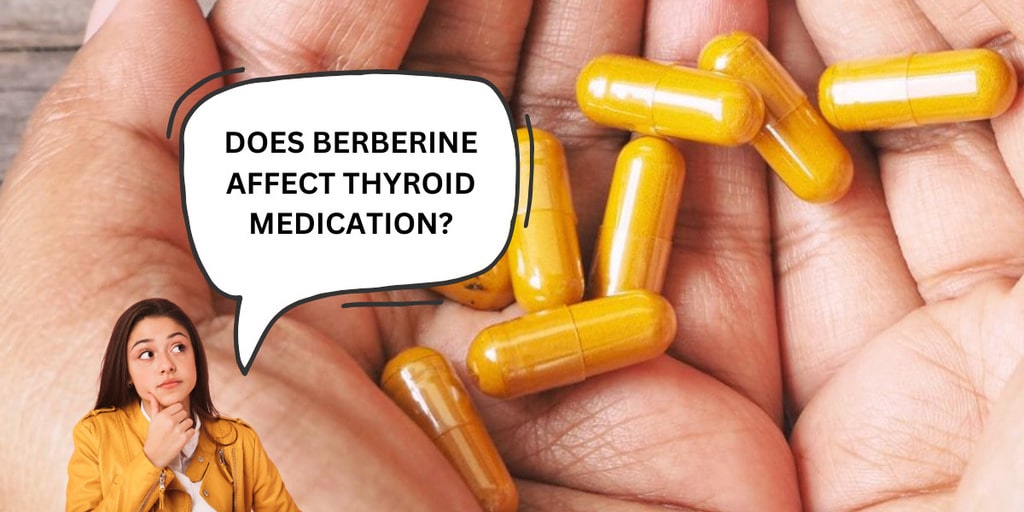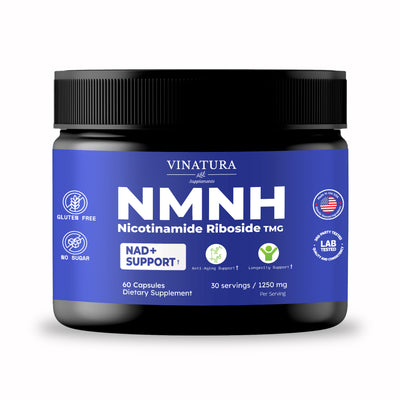
Does Berberine Affect Thyroid Medication?
Today, there is increasing evidence supporting the health benefits of berberine. However, questions arise for those using thyroid medication, like: “Does berberine affect thyroid medication?” and, if it doesn’t, what’s the safe dosage? This article answers these questions in detail, so read on to discover more!
Before exploring further, please read the disclaimer located at the end of this webpage.
Key Takeaways
- Berberine positively affects thyroid treatment with methimazole, enhancing absorption and metabolism. Additionally, berberine improves gut health, encouraging better appetite and digestion.
- With thyroid medication, 250 - 500 mg of berberine can be taken orally (divided into 2 - 3 times/day).
What Are Berberine Benefits?

Berberine is a powerful antibacterial and antioxidant compound in specific plants, particularly their roots, stems, and bark, such as European barberry, tree turmeric, goldenseal, Oregon grape, Phellodendron, and turmeric. Berberine is easily recognized by its distinctive yellow colour and bitter taste.
Chinese physicians have used Berberine for over 3,000 years for its antimicrobial and anti-diarrheal properties, and its benefits extend far beyond these uses. In 1993, researcher Karimov discovered that ancient peoples (dating back to 650 BC) also used barberry as a natural blood purifier [1].
As research continues, new evidence highlights additional valuable applications of berberine, including:
- Treating altitude sickness, infections, and fever: Research conducted by San Martín (1983), Houghton and Manby (1985), and Anesini and Perez (1993) confirms these benefits [1].
- Regulating blood pressure, countering arrhythmias, supporting heart function, and occasional pain relief: Studies by Battu et al. (2010), Bhutada et al. (2010), and Kulkarni and Dhir (2010) confirm these findings [2].
- Inhibiting viruses, including influenza AH1N1 and HIV: Findings by Cecil et al. (2011) and Zha et al. (2010) show berberine’s potential against various viruses [2].
- Supporting blood sugar control: A study on 80 type-2 diabetes patients who took 480 mg of berberine daily demonstrated its ability to stabilize blood glucose levels [3].
- Shortening recovery from oral ulcers and reducing discomfort: Applied as a topical gel four times daily, berberine reduced symptoms in 84 participants with mild oral ulcers [4].
Berberine can be taken as a supplement (capsules, tablets, powder) with a recommended daily dose of 250-500 mg, divided into 2-3 doses daily [5]. It can be applied topically (at least twice daily) for skin or wound applications. However, usage and dosage may vary depending on an individual’s health condition and goals, so it’s best to consult a doctor or nutritionist for precise guidance.
Berberine and Weight Loss with a Thyroid Condition
Most individuals with thyroid disease (*) are at risk of developing diabetes. When the thyroid becomes weakened and unable to function properly, it can compromise the body’s immune system over time, potentially leading to diabetes. A concerning symptom of diabetes is unexpected weight loss, as insufficient insulin production forces the body to break down stored fat for energy.
For individuals with thyroid conditions experiencing unexpected weight loss, exploring potential underlying metabolic concerns may be beneficial. In such cases, berberine is often considered a supportive supplement for maintaining metabolic balance and overall wellness.
Research indicates that berberine can aid in maintaining healthy glucose metabolism, which may indirectly support weight management by helping reduce cravings for calorie-dense foods and sugary treats. Additionally, berberine contributes to efficient digestion and nutrient utilization, promoting a healthier body composition by supporting optimal metabolic function.
(*) The thyroid is a small, butterfly-shaped endocrine gland located in the front of the neck, responsible for producing hormones that regulate growth and function across most internal organs.
Can Berberine Influence Thyroid Function?
Studies confirm that berberine can both stimulate or inhibit thyroid activity. The exact impact depends on its therapeutic purpose—whether treating hyperthyroidism (for hypothyroid patients) or hypothyroidism (for hyperthyroid patients)—with dosage variations prescribed by physicians accordingly. For example, 50 mg/kg of berberine can stimulate thyroid function, while higher doses can suppress thyroid activity [6].
Additionally, the gut microbiome is closely linked to thyroid function. If the thyroid encounters issues, the digestive system often reflects this with symptoms like digestive irregularities and irritable bowel. When berberine is properly incorporated, digestive health typically improves, reducing the functional burden on the thyroid, which then operates more efficiently, decreasing the likelihood of hypothyroidism.
Specifically, berberine’s antibacterial properties support a balanced gut microbiome by encouraging the growth of beneficial bacteria and inhibiting harmful bacteria, creating a healthy, stable gut environment.
Does Berberine Affect Thyroid Medication?

Yes, it does. Berberine can positively impact thyroid patients by:
- Balancing the gut microbiome: Berberine interacts positively with methimazole, a thyroid medication, by improving its metabolism, allowing for faster absorption and digestion. A healthy gut, as mentioned, supports thyroid health.
- Accelerating treatment time: For patients using methimazole for hyperthyroidism, pairing it with berberine may enhance absorption speed, leading to shorter treatment times.
For safety, consult your doctor for a detailed plan if taking berberine with thyroid medication.
Things to Remember When Taking Berberine for Weight Loss with Hypothyroidism
To maximize the health benefits of berberine and minimize potential side effects, please keep the following in mind:
- Taking excessive amounts of berberine may lead to symptoms like nausea, bloating, constipation, and stomach pain.
- Berberine may interact with antidepressants, blood thinners, beta-blockers, and MAOIs. Consult your doctor before taking these medications.
- Berberine is not suitable for pregnant or breastfeeding women or children and should be used cautiously in other sensitive groups.
- To prevent adverse effects, avoid taking a high dose at once. Instead, divide the daily intake into 2–3 smaller doses.
- Regularly monitor liver health while taking berberine to avoid putting undue stress on the liver, which could lead to liver issues.
- Combine berberine use with a balanced diet and appropriate exercise routine to enhance health outcomes rather than relying solely on supplementation.
Conclusion
We hope this article has answered your questions about whether berberine affects thyroid medication. Used correctly, berberine can support thyroid health by interacting positively with thyroid drugs. Additionally, a balanced diet and lifestyle are essential for effective treatment. Consult your doctor for guidance to ensure the safest approach to using berberine for thyroid health.
References
- [1] Neag, M. A., Andrei Mocan, Echeverría, J., Pop, R. M., Bocsan, C. I., Gianina Crişan, & Buzoianu, A. D. (2018). Berberine: Botanical Occurrence, Traditional Uses, Extraction Methods, and Relevance in Cardiovascular, Metabolic, Hepatic, and Renal Disorders. Frontiers in Pharmacology, 9. https://doi.org/10.3389/fphar.2018.00557.
- [2] Singh, S., Pathak, N., Fatima, E., & Arvind Singh Negi. (2021). Plant isoquinoline alkaloids: Advances in the chemistry and biology of berberine. European Journal of Medicinal Chemistry, 226, 113839–113839. https://doi.org/10.1016/j.ejmech.2021.113839.
- [3] Mojgan Sanjari, Behrang Shamsinejad, Payam Khazaeli, Safi, Z., Fatemeh Mirrashidi, & Naghibzadeh-Tahami, A. (2020). Safety and efficacy of Berberis integerrima root extract in patients with type 2 diabetes. A parallel intervention based triple blind clinical trial. Journal of Diabetes & Metabolic Disorders, 19(1), 71–80. https://doi.org/10.1007/s40200-019-00478-z.
- [4] Jiang, X.-W., Zhang, Y., Zhu, Y.-L., Zhang, H., Lu, K., Li, F.-F., & Peng, H.-Y. (2012). Effects of berberine gelatin on recurrent aphthous stomatitis: a randomized, placebo-controlled, double-blind trial in a Chinese cohort. Oral Surgery Oral Medicine Oral Pathology and Oral Radiology, 115(2), 212–217. https://doi.org/10.1016/j.oooo.2012.09.009.
- [5] Key, A. P. (2020, November 13). Berberine: Benefits and Side Effects. WebMD. https://www.webmd.com/obesity/berberine-health-benefits.
- [6] Maurya, H., Dhiman, S., Dua, K., & Gupta, G. (2016). Pharmacological Effect of Berberine Chloride in Propyl Thiouracil Induced Thyroidal Dysfunction - A Time Bound Study in Female Rats. Recent Patents on Drug Delivery & Formulation, 10(2), 165–173. https://doi.org/10.2174/187221131066616032112361.
Author

Product Disclaimer
The dietary supplement products mentioned on this website are formulated based on scientific research and adhere to FDA guidelines for dietary supplements. However, the content of the articles has not been evaluated by the Food and Drug Administration (FDA) and is not intended to promote or endorse any specific product. Any products sold on this website are not intended to diagnose, treat, cure, or prevent any disease.
Opinions and Endorsements
Any claims, statements, or opinions expressed in the articles are those of the author(s) and do not necessarily reflect the views or opinions of the manufacturers of the dietary supplement products. The products sold on this website are separate from the content of the articles and are not directly endorsed or associated with the information presented here.
Liability Disclaimer
The author(s) of the articles, website, and manufacturers of the dietary supplement products do not assume any liability for any potential consequences arising from the use of the information provided in the articles. It is recommended that individuals consult with a qualified healthcare professional before making any dietary or lifestyle changes, including the use of dietary supplements.
Product Usage
Please refer to the product labels and packaging for specific usage instructions and guidelines for the dietary supplement products sold on this website.
Customer Support
For any concerns or questions regarding the dietary supplement products, please contact our customer support team, who will be more than happy to assist you.





Leave a Comment
Be the first to comment.
What do you think?